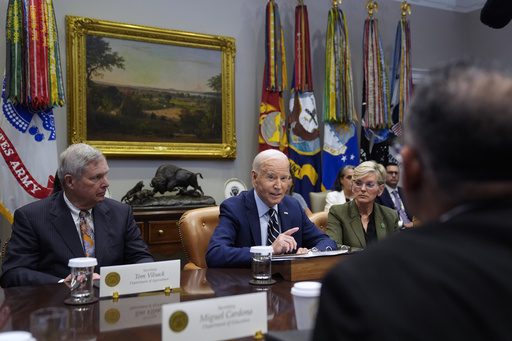In a notable return to political campaigning, President Joe Biden ventured into the competitive 2024 electoral landscape, engaging in key states after a period of reduced visibility following his reelection bid suspension. Biden made stops in Pennsylvania and Wisconsin to bolster fellow Democrats facing tough challenges ahead of next year’s elections.
During his fundraising event in suburban Philadelphia for Senator Bob Casey, Biden received a warm welcome. This gathering coincided with the Philadelphia Phillies playoff game, indicating the cultural significance of the event for attendees.
Conversely, in Milwaukee, where Biden underscored his administration’s commitment to tackling the issue of lead contamination in drinking water, Senator Tammy Baldwin did not attend. This absence highlights the differing strategies among Democrats facing tough reelection campaigns, as many decide that the potential risks of associating with Biden outweigh the possible benefits.
Political analyst Christopher Borick noted that the diminished influence of Biden is a reality facing many Democrats in contentious races, suggesting that his presence may not be advantageous for them in a climate of low approval ratings.
Since withdrawing from the race in July, Biden has kept a relatively low profile, making his appearances in these pivotal states especially noteworthy. Both Casey and Baldwin’s campaigns are crucial for the Democratic Party’s aim to retain control of the Senate.
Though Biden committed to campaigning vigorously for Vice President Kamala Harris and other Democrats, he has largely remained off the front lines, with some questioning his effectiveness as a campaign surrogate due to his mixed approval ratings.
Despite this, one unifying factor remains: a strong opposition to former President Trump. At both events, Biden criticized Trump, particularly regarding recent revelations about Trump’s handling of COVID-19 tests for Russian President Vladimir Putin, emphasizing the threat to national security posed by their relationship.
Casey, who is seeking a fourth term, has deep ties to Biden, as they share roots in Scranton, Pennsylvania. Biden invoked this connection, contrasting his and Casey’s values with Trump’s lifestyle.
Despite Biden’s efforts, around 40% of Pennsylvanians hold a favorable view of him, with even fewer showing support in Wisconsin, complicating the landscape for candidates like Baldwin, who has largely distanced herself from the president by focusing on other events.
Baldwin’s absence from Biden’s visit has drawn criticism; she was engaged in a different event recognizing her work with local farmers. Her campaign emphasizes her focus on issues directly impacting her constituents, which may explain her avoidance of Biden’s appearances despite their partnership in the Senate.
While attending events away from Biden, Baldwin is still in a closely contested race against her Republican opponent. Wisconsin GOP Chairman Brian Schimming pointed out the challenge Baldwin faces in maintaining her standing with voters irrespective of Biden’s influence.
In Milwaukee, Biden highlighted an important federal initiative to replace lead pipes—a commitment reinforced by significant funding from the infrastructure law. He took the opportunity to criticize both Trump and Senator Ron Johnson for their opposition to this crucial legislation, which aims to mitigate substantial public health risks associated with lead exposure.
Biden’s campaign stop included praise from local officials, recognizing his commitment to Milwaukee, a city Trump had disparaged in the past. Democratic representatives noted that while Biden’s personal popularity may not be high, his policies resonate with many voters in the state.
Looking ahead, First Lady Jill Biden is set to embark on a campaign in battleground states, including a visit to Madison, Wisconsin, to support Harris, which reflects an ongoing commitment from the Biden administration to rally support for Democratic candidates in the coming elections.


